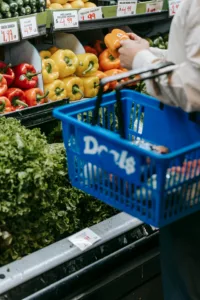The food retail and consumer packaged goods (CPG) sector is on the cusp of a groundbreaking transformation. When we asked ourselves which trend will shape the sector in 2025, one clear frontrunner emerged: artificial intelligence (AI). This article looks at how AI will revolutionize the industry and set new standards in terms of efficiency, personalization and innovation.
The AI-driven future of retail
By 2025, artificial intelligence will no longer be just a buzzword, but an indispensable reality for retailers and consumer goods manufacturers. According to a study by the Boston Consulting Group, 83% of retailers believe that AI will be crucial to their success in the next five years [2]. This assessment is not unfounded, as AI promises to fundamentally change the way companies operate and interact with customers.
Key areas of AI application in retail

1. Accurate prediction of customer behavior
AI systems will be able to analyze huge amounts of data in real time and derive precise predictions about customer behaviour and market trends[6]. This will enable companies to react proactively to changes and adapt their strategies accordingly.
2. Personalization at the highest level
The ability to understand and respond to individual customer preferences will reach new heights in 2025. AI will enable retailers to create highly personalized shopping experiences, from tailored product recommendations to individual price offers [6].
3. Optimization of the supply chain and inventory management
AI will play a key role in improving operational efficiency. By analysing production, warehouse and logistics data, companies can improve their capacity utilization, optimize stock levels and make supply chains more robust.
4. Automation and efficiency increase
From order automation to quality control - AI will optimize and automate numerous processes. This will not only lead to cost savings, but also to an increase in product quality and customer satisfaction [4].
AI as a driver of innovation in product development
One particularly exciting aspect is the use of AI in product innovation. Companies will use AI to:
– Identify new ingredients
– Develop product recipes
– Creating innovative flavors
– Improving food safety
– Supporting sustainability goals [1]
These developments will significantly expand and improve the product range in the food retail and consumer goods sectors.
Challenges and opportunities
Despite the enormous potential, AI integration also brings challenges. Companies have to face technical, economic, political and legal hurdles [4]. Data protection and ethical issues will also play an important role. It is often the data that makes implementation difficult, as it is not available in the right quantity and quality.
Nevertheless, the opportunities clearly outweigh the risks. Studies show that companies can achieve average sales growth of around 15% through the targeted use of AI. This underlines the enormous economic potential of this technology.
Conclusion: AI as the key to success
The integration of AI in food retail and the consumer goods industry will not just be a trend in 2025, but a necessity. Companies that invest in AI technologies at an early stage and use them skillfully will have a decisive competitive advantage. They will be able to react faster to market changes, operate more efficiently and offer a customer experience that goes far beyond today's standards.
The AI revolution in retail is unstoppable. It will fundamentally change the way we shop, produce and consume. Companies that actively shape this development will be the winners of tomorrow.
The original sources:
[1] https://www.innovamarketinsights.com/de/trends/lebensmittel-und-getraenke-trends-2025/
[2] https://polygon-software.ch/blog/wie-kuenstliche-intelligenz-den-einzelhandel-veraendert/
[3] https://www.dlg.org/fileadmin/Pressemitteilungen/26d083b17c084b2e1733471571402.pdf
[4] https://datasolut.com/kunstliche-intelligenz-im-einzelhandel/
[5] https://www.anuga.de/magazin/beitraege/anuga-horizon-2025-der-internationale-treffpunkt-fuer-die-zukunft-der-lebensmittelbranche.php
[6] https://www.cassini.de/inspire/ki-im-einzelhandel
[7] https://lebensmittelpraxis.de/handel-aktuell/41945-branchenausblick-2025-berater-sehen-ki-und-kreislaufwirtschaft-als-schluesseltrends-im-handel.html
[8] https://www.reply.com/de/retail-and-consumer-products/retail-forward
[9] https://www.ktchnrebel.com/de/food-trends-2025/
For further information, please contact contact@circly.at or use our contact form https://www.circly.at/en/contact to book an appointment.